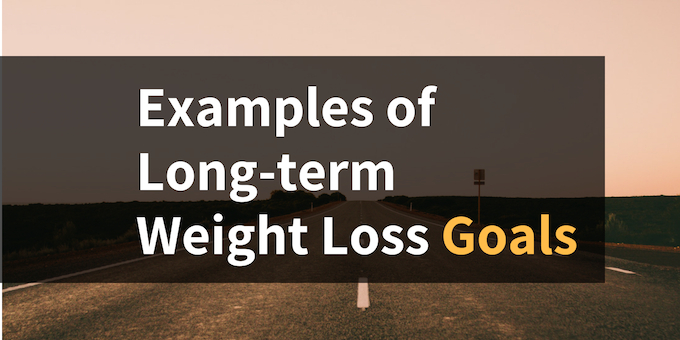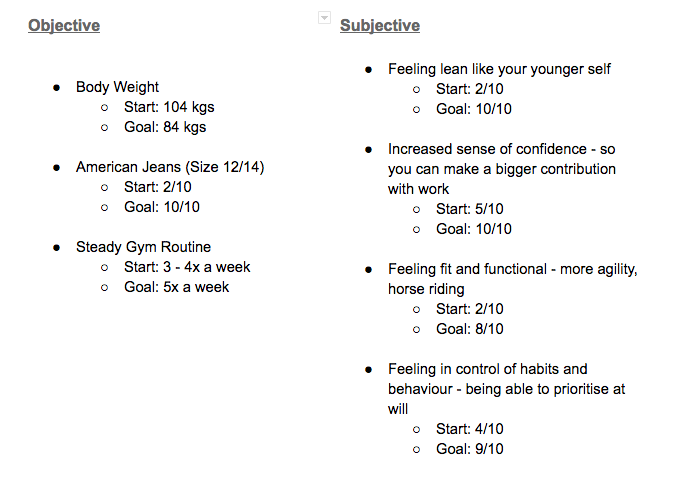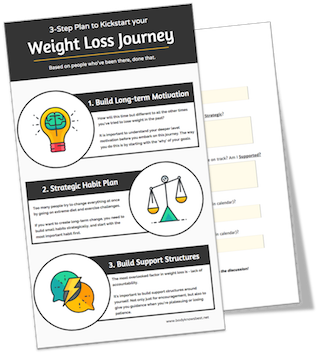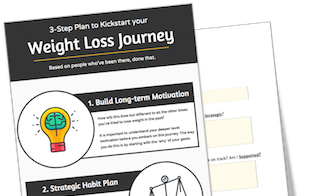Examples of Long-term Weight Loss Goals


If you are purely a numbers person and don't care about the philosophy I'm about to share with you, here is what you came for:
Short answer:
"You should aim to lose 0.5-1 percent of your body weight per week over the long-term."
(example - for a person who weighs 70kg, that is 0.35 - 0.7kg per week)
Now onto the philosophy….
Most weight loss goals actually hinder you from achieving long-term progress.
You read that right.
Most people set their goals in a way that negatively affects their long-term progress.
Example of a traditional weight loss goal:
"I'm going to lose 10 kg in 12 months."
Now let's say you have lost 3kg by the 6 month mark.
If you are attached to your goals that you set at the start of the year, you will feel disappointed.
And that feeling of disappointment will make you question the actions you are taking.
This self-doubt is likely to take you into a downward spiral where you might end up completely abandoning your goals.
The mistake of setting goals too early
The funny thing is that you usually set weight loss goals at the START of your journey.
And the start of your journey is when you are LEAST educated about what it takes to lose weight over the long-term.
Intellectually, you may know what to do.
But experientially, you haven't experienced the physical and emotional labour that goes with achieving your goals.
You don't know how big or small the changes you need to make in your lifestyle.
You don't know how quickly your body will respond to the changes you make.
You don't know what trade-offs you might need to make to achieve your goals.
What I'm trying to tell you is that the start of your weight loss journey is when you LEAST know what it takes to lose weight.
Yet, we try to predict the future by setting weight loss goals and being attached to them.
We're making an uneducated guess of when we'll be able to achieve our weight loss goals.
And an attachment to that uneducated guess will lead us to feel like we 'failed.'
Key Takeaway
We usually set goals without knowing what the journey might entail. If you get attached to such goals, you are setting yourself up for disappointment.
What's the alternative?
When working with clients, we set two kinds of goals together.
But before even we get to that, we first have an in depth conversation of what it means to set goals.
How goals are like lamp posts guiding you to the direction you want to go.
Your goals at the start may change depending on what you learn about yourself throughout the journey.
And beyond that, we should understand that reaching the goal is not the end destination.
You don't get happy AFTER you reach a goal.
That's a common misconception.
Happiness is a by-product of the quality of your journey you embark on a day-to-day basis.
Not just reaching the end destination.
Interesting Video
My outlook on goals was influenced by a wise man by the name of Sadhguru. You can watch a video of him talking about goals here.
So what are examples of the types of goals that we set?
#1 - Objective
These are related to things we can measure, usually numbers.
Examples include:
- Actual weight - yes we use this, but we don't give it as much importance as others.
- Body girth measurements - these are more reliable to see changes in our body composition (waist, thighs, arms)
- Your dress or belt size - you'll know for sure when things fit on easier!
- Photos - preferably in the same lighting and clothing (back, side and front)
Note: recommended to measure at the same time of the day each time
#2 - Subjective
These are related to how we feel.
Many people don't consider these but ultimately, we embark on a weight loss journey because we want to feel a certain way.
The progress in how you feel mentally can happen a lot quicker than your physical results.
It is important to keep a track of this so you start seeing all the different parts of your life your weight loss journey is impacting.
What feelings you want measure will change depending on each person and what's important to them.
Here's an example from a client to give you ideas.

Note: We use a scale out of ten to quantify progress even for subjective goals.
Bottom Line
Feel free to set objective weight loss goals with numbers.
However, remember to not get attached to them because your journey goes beyond these numbers.
Make sure to include subjective goals as well as these are usually the deeper level reasons of embarking on your weight loss journey.
- Kern
About the Author - Kern Kapoor
Kern's interest in psychology and human behaviour lead him to lose 34kg. He is a Certified Nutrition Coach (Pn2) and is currently on a mission is to create a community of 10,000 people who have undergone long-term body transformation.
If you'd like some one-on-one help with your weight loss goals, get in touch with him at kern@bodyknowsbest.net.

The 3-Step Plan to Kickstart your Weight Loss Journey

Unsure where to start?
This worksheet will help you come up with an action plan right now!


